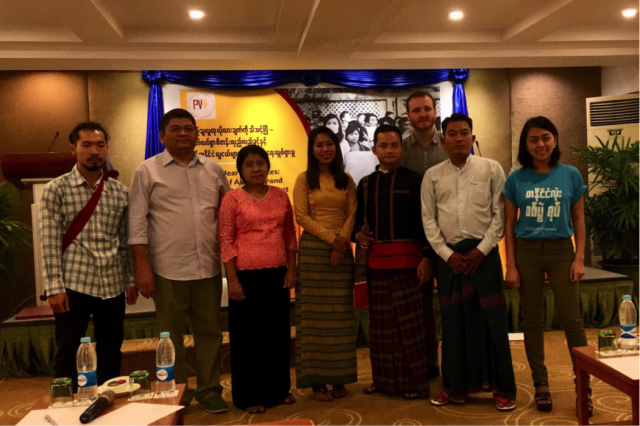Speaking out for peace and freedom

Further proposed amendments to the peaceful assembly law would further limit freedoms, Progressive Voice said. (Sharon Pun | Frontier)
YANGON — The National League for Democracy government’s 2016 amendment to a law regulating protests has created a “backdoor” for the authorities to control demonstrations and bring charges against organisers, an advocacy group has said in a recent report.
In its briefing paper released last week, Time to Hear Our Voices: Freedom of Assembly and the Youth Peace Movement in Myanmar, Progressive Voice said section 10(k) of the amended law, which requires organisers and protestors to follow predefined local regulations and related agreements, enabled the authorities to enact rules that “contradict” the law.
Under the law, organisers only have to give the authorities at least 48 hours’ notice of their intention to protest, and they do not need to seek permission or approval. However, police and local administrators have interpreted section 10(k) as meaning that they “can make rules that apply to all assemblies in a given township, or can insist on coming to an agreement with organisers about all details of an assembly”.
This section has been used to charge 17 people involved in organising a peace demonstration in Yangon in May. They face up to one month in prison.
Progressive Voice executive director U Aung Khaing Min, 45, said there are problems with the both the intention and interpretation of the law, which has “grey areas” and so can be used to target certain groups. He believes that instead of requiring police to facilitate protests and protect those participating, the law enables them to control peaceful assemblies.
Progressive Voice also said protest organisers are still required to submit information about the slogans and signs they intend to use, which gives authorities a chance to suppress any protests that express opinions they disagree with.
Meanwhile, further proposed amendments to the peaceful assembly law would further limit freedoms, the organisation said. An amendment bill passed earlier this year in the Amyotha Hluttaw, the upper house of the national parliament, would require protest organisers to submit information on their sources of funding. The bill has not yet passed in the lower house.
The proposed amendments to the law would further limit freedoms, said Dr Nyo Nyo Thin, 50, a former independent member of parliament. “If these amendments are passed, the police will be able to interpret the law any way they want to, and our basic right to freedom of assembly will be completely gone,” she said.
Altogether at least 47 youth activists are facing charges from protests held in Yangon and Myitkyina, Kachin State, in May that called for an end to civil conflict.
Ma Thin Zar Shun Lei Yi, 26, a member of Action Committee for Democracy Development, is being charged for her involvement in a Yangon protest on May 12, in which demonstrators called for an end to the war. She said this was not the first protest of its kind she had helped to organise, but that police had reacted “completely differently” this time. This revealed the sensitivity of the military, she said.
Nationalist counter-protestors appeared to cooperate with police to arrest protestors, she said, which showed that the law was selectively applied. “We obeyed the law and submitted a notification, they didn’t. Why are we the ones being arrested?” she said.
Protest organiser Ma Ei Ei Moe, 30, thinks it was still successful in showing the public that Myanmar is not yet a democracy and that more needs to be done to fight for the right to freedom of assembly. With this aim, the organisers will prepare long-term plans, including further protests and contingency plans to protect protestors.
The briefing by Progressive Voice, which is available in both English and Myanmar, also focuses on the role of female organisers and protestors. Ei Ei Moe, as a female activist, called for a stop to abuses against women. She told Frontier that strangers had threatened her by telephone, telling her they had photographs of her. There were suspicious-looking men around her home, she said, which made her feel scared.
Progressive Voice asked authorities to immediately drop all charges against individuals who have been wrongfully charged for their role in peaceful protests and to amend the Peaceful Assembly and Peaceful Procession Law to ensure freedom of assembly. It also called on the government, the military and the international community to ensure IDPs received humanitarian aid and to end the conflict.
Nyo Nyo Thin said she participated in the launch, although it was not popular among politicians, because she believed in the importance of pursuing peace and democracy. Asked if she hoped that this could be achieved, she said there was no guarantee that anything would improve, “But even if we do not have hope, we have to [try].”
See this original post HERE.

